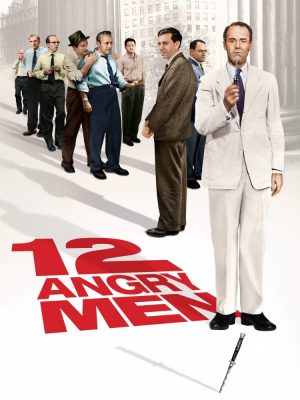
“12 Angry Men” is a gripping drama that takes place in the course of a single day, as twelve jurors deliberate the fate of a young man accused of murdering his father. The film is divided into several parts, each of which highlights a different aspect of the deliberations.
Part 1: The Setup
The film opens with the judge’s instructions to the jurors, followed by their initial deliberations. The jurors take their seats around a long table, and the foreman begins the vote. Eleven jurors vote guilty, while Juror 8 (Henry Fonda) votes not guilty, setting the stage for the intense deliberations that follow.
Part 2: The Arguments
Juror 8 is initially seen as an obstacle, someone who is needlessly complicating the proceedings. However, as he begins to make his case, the other jurors are forced to confront their own prejudices and biases. Juror 8 argues that the evidence is circumstantial, and that there is reasonable doubt as to the defendant’s guilt. He is methodical in his approach, dissecting the evidence piece by piece and exposing inconsistencies in the prosecution’s case.
Part 3: The Tension
As the deliberations continue, the tension in the jury room mounts. Tempers flare, and the jurors become increasingly frustrated with one another. Juror 3 (Lee J. Cobb) in particular becomes agitated, lashing out at Juror 8 and refusing to consider his arguments. The jurors are also forced to confront issues of race and class, as some of them express prejudiced views about the defendant and the witnesses.
Part 4: The Turning Point
Despite the obstacles, Juror 8 begins to sway some of the jurors to his side. They begin to see the case in a different light, and become more willing to consider the possibility that the defendant is not guilty. One by one, they change their votes, until only Juror 3 remains steadfast in his conviction of the defendant’s guilt.
Part 5: The Climax
The climax of the film comes as the jurors confront Juror 3’s stubbornness and attempt to persuade him to change his vote. They appeal to his reason, his conscience, and his humanity, trying to make him see that he is acting out of prejudice rather than logic. As the tension builds, the jurors are forced to confront their own flaws and biases, and to question the assumptions they have made about the case.
Part 6: The Verdict
In the end, after much debate and soul-searching, the jurors reach a unanimous verdict. The defendant is found not guilty, and justice is served. The jurors file out of the room, their minds and hearts forever changed by the experience they have just shared.
“12 Angry Men” is a powerful testament to the power of reason and the importance of standing up for what you believe in, even in the face of overwhelming opposition. It is a film that challenges us to examine our own prejudices and biases and to be willing to change our minds when confronted with new evidence and arguments.
Review
12 Angry Men, directed by Sidney Lumet and written by Reginald Rose, follows the deliberations of a jury tasked with deciding the fate of a young man accused of murdering his father. As the film progresses, tensions rise and the jurors are forced to confront their own biases and prejudices.
The film is a masterclass in storytelling, using a minimalist setting and a tight script to create a powerful narrative. The performances by the ensemble cast are all top-notch, particularly those of Henry Fonda as the lone dissenter and Lee J. Cobb as the most vocal advocate for conviction. The film also delves into deeper themes of justice, morality, and the human condition, making it a timeless classic that still resonates with audiences today.
One interesting aspect of the film is its use of space and setting to create tension and drama. The confined space of the jury room, combined with the oppressive heat of the day, heightens the emotional stakes and creates a sense of claustrophobia that reflects the increasing pressure on the jurors to come to a verdict. The film also uses camera angles and lighting to accentuate the power dynamics at play, with characters looming over others or lurking in shadows to exert their influence.
Overall, “12 Angry Men” is a triumph of filmmaking that continues to be celebrated for its technical and thematic achievements. It is a must-see for any fan of drama, legal thrillers, or classic cinema.